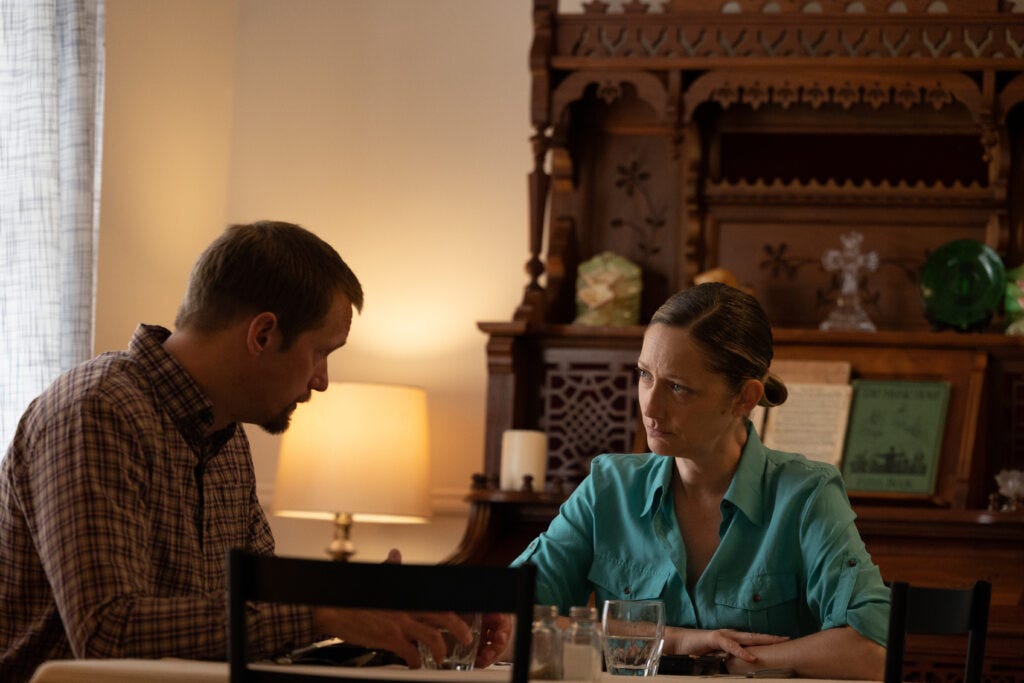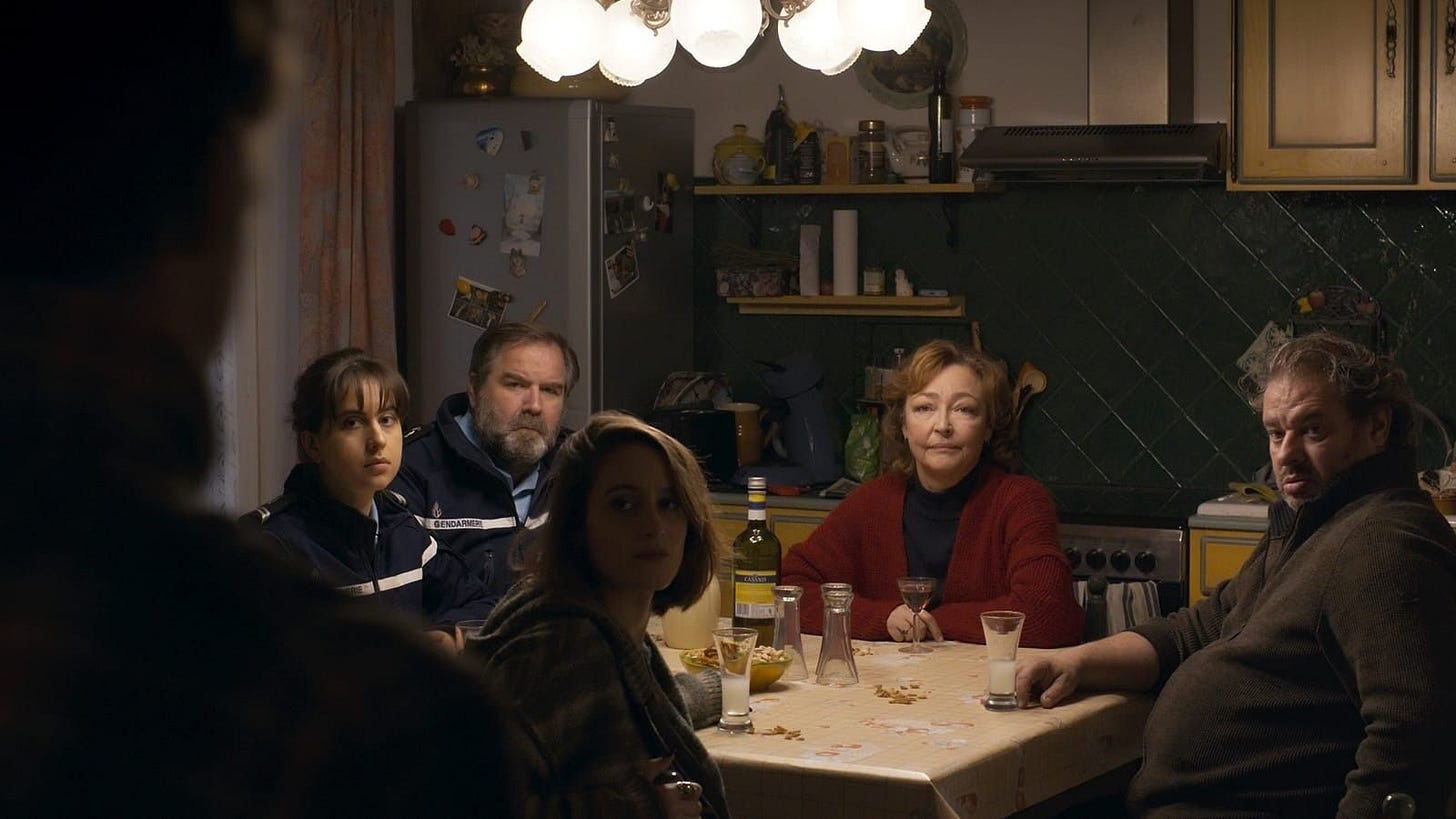New Reviews + New Short Film!
Two new movie reviews of Eric LaRue & Misericordia; both I highly recommend. In the coming weeks, more library-related new releases, CCFF and much more!
Check it out! Since this here website/podcast covers more than just film, figured it was time for a new logo and of course, I had to include a cat because I’m cool for cats.
Before we get to a couple of new releases I reviewed, I decided to make a new straightforward short film — Silent Type, about the need for solitude at work. It starts out in my hometown of Calumet City and then heads right to the present - where I live and work at in Rogers Park. It gave me the chance to shoot some quiet, composed scenes of stillness as well as utilize a piece of music I made a while ago. Feel free to view here, then log on Letterboxd. Only 4 minutes long:
Eric LaRue (dir. Michael Shannon)
Michael Shannon, my favorite actor working today, is known for his fierce intensity and aching vulnerability, consistently commanding the screen especially when you think of his exceptional work in Take Shelter. Here, he makes his directorial debut with Eric LaRue, a tense exploration of grief, guilt, and the search for meaning and spiritual connection in the wake of tragedy.
Adapted from Brett Neveu's stage play of the same name, the film centers on Janice LaRue (an excellent Judy Greer), a mother grappling with the aftermath of her teenage son's horrific act—the murder of three classmates in a school shooting. The father (Alexander Skarsgård) is trying to hold onto his wavering faith in the midst of dealing with what's happened and finding ways to cope that are quite the opposite of his spouse. Other characters walk in and out of the picture, including a wide-eyed religious devotee (the always wonderful Alison Pill) and a well-meaning but misguided minister, played by Paul Sparks, trying to meditate everyone's response to the trauma that has plagued the town.
Shannon's film doesn't focus on the shooting itself but rather on the devastating ripple effects that radiate outward, particularly through the lives of the shooter's parents. This approach allows for a nuanced, thoughtful examination of how violence transforms not just individuals but entire communities, raising difficult questions about blame, forgiveness, and learning how to let go of the pain.
At the heart of Eric LaRue is Judy Greer's astonishing performance as Janice. It is a career-high, to say the least. Her face looks worn and weary accessing a wide range of conflicting emotions, whether it's responding to a customer at the store she works at commenting on merchandise behind the counter or a failed attempt to reach out and open up during a grief support group. Known primarily for comedic supporting roles in indie dramedies, Greer embodies a woman shattered by circumstances she never could have imagined. It's proof that she needs to take on more roles like this in the future.
Janice often moves through the world like a ghost, hollow-eyed, distraught, disconnected, smoking cigarettes compulsively as if each inhale might somehow make sense of her new reality. When she stares at the spot in her son's room where he hid the weapons, the silent devastation on her face speaks volumes about parental guilt and the torturous "what ifs" that will haunt her forever.
Alexander Skarsgård is also quite good as Ron, Janice's husband, who copes with his grief by throwing himself into evangelical Christianity. At times, he's clearly awkward and uncomfortable, often resorting to offering a neck massage to anyone who'll say yes. Like a lot of men who don’t make an effort (or go to therapy), communication isn’t his strongest suit. There’s something off about nearly interaction taking place mainly because people don’t know what to say.
While Janice remains trapped in her pain, unwilling or unable to release it, Ron seeks salvation through rigid religious doctrine, creating a widening gulf between them, which may, in turn, lead to a connection with Alison Pill's Lisa. Everyone, including the victim's mothers, exhibits divergent responses to depression. This forms some of the film's many compelling dynamics, illustrating how tragedy can either bind people together or drive them irreparably apart.
Shannon's direction shows remarkable restraint, particularly for a first-time filmmaker. There's not a lot of showiness to where the camera goes, mainly focusing on stillness, muted colors or the lack of light coming from the characters and the world they inhabit. He allows scenes to breathe, holding on to Greer's face as she processes the latest indignity or confrontation. The film has a disorienting quality that mirrors Janice's disassociation—with cinematography by Andrew Wheeler employing composition choices that enhance the sense of a world permanently altered and de-saturated, where nothing feels quite right.
One of the film's most powerful sequences comes when Janice finally meets with two mothers of her son's victims, facilitated by the pastor. The raw emotion in this confrontation—particularly between Janice and the unforgiving Stephanie (Annie Parisse)—is almost unbearable to watch. Shannon wisely keeps his camera steady and focused, allowing the performances to carry the weight of the moment without stylistic intrusion.
Even more devastating is Janice's long-delayed prison visit to see Eric (Nation Sage Henrikson), which occurs in the film's final act. Again, no big speeches or catharsis or answers. Just two people having a challenging conversation given everything they've gone through. Shannon's decision to keep the actors apart until filming this pivotal scene pays dividends in their palpable discomfort and disconnection. The chasm between mother and son feels insurmountable, and their stilted conversation reveals the terrible truth that they may have never truly known each other at all.
As much as I responded favorably to Eric LaRue, it does sporadically struggle with tonal consistency that feels jarring in the moment. There's an unexpected vein of dark humor running through the film, particularly in its portrayal of the spiritual community responds. Alison Pill delivers a memorably funny, unhinged performance as Lisa, a devout church member who takes a perhaps too-keen interest in Ron's spiritual journey.
These moments of uncomfortable, surprising bursts of comedy provide levity from the film's overwhelming heaviness, but they sometimes threaten to undermine its serious examination of grief. However, I imagine the tonal shift comes from the writer's offbeat approach to the material —looking at tragedy does intermingle with comedy. I can see how some might be put off.
Shannon and Neveu possess an askew, enlightening view of religion, particularly evangelical Christianity, which it portrays with nuance through great actors like Pill, Sparks and a small showcase for Tracy Letts. This perspective on how the faithful respond to tragedy stems from the source material's thematic concerns about how spirituality can either heal or hinder in times of crisis; thankfully it embodies a more balanced approach which helps strengthen the overall impact.
Eric LaRue announces Shannon as a director of considerable confidence, clearly an actor's director since he's been working with all types both on stage and in front of a camera. An actor's sensibility is evident in the uniformly excellent performances he draws from his cast, and his storytelling demonstrates a thoughtful understanding of how to convey internal states.
The film offers no resolution—how could it, given this challenging subject matter? —but instead invites viewers to sit with uncomfortable questions about responsibility, forgiveness, and the possibility of moving forward after the unthinkable. Even the choice for a closing credit cover song leaves you with a lot to ponder. (If I’m not mistaken, the song comes courtesy of the talented Scott Lucas from Local H who I had the pleasure of seeing perform with Michael Shannon at the Empty Bottle when they paid tribute to the great Ric Ocasek by playing Cars covers).
In an era where school shootings have become tragically commonplace in American life, Eric LaRue offers a compelling perspective on the psychological damage left behind, focusing on a parent racked with guilt. By focusing on the family of the perpetrator rather than the victims, Shannon forces us to confront the full human cost of these events and the complex web of factors that contribute to them.
This is not an easy watch, but it's an important one, anchored by Greer's career-defining performance and Shannon's assured direction. Eric LaRue bears witness to individual suffering and asks us to do the same. In that act of witnessing lies the possibility, however faint, of understanding and, perhaps someday, healing and coming to terms. Eric LaRue is one of the year’s best films containing a central performance that I’ll be thinking about for quite some time.
Misericordia (dir. Alain Guiraudie)
From what I hear, there are several great new movies currently playing. I need to catch up with Eephus, On Becoming a Guinea Fowl among others and I will at some point before the year’s end. But out of all the ones that have opened recently, I had to make the latest by Alain Guiradie a priority given the fact that I’ve loved just all about his work to date. Ever since both Patrick and I proclaimed our love for what remains his best film, Staying Vertical, I anticipate whatever is next.
That being said, I was a little bit nervous for the first act of his latest, since I almost found it to be surprisingly slow, restrained and lacking a strong setup. But that all changed about a half hour in once the Hitchockian-level confrontation sets off a wild chain of events, the kind that Guiraudie revels in with every film.
Set in the remote countryside village of Saint-Martial in Southern France, Misericordia begins with Jérémie (Félix Kysyl), a young baker, returning to his hometown for the funeral of his former boss, Jean-Pierre. What initially appears to be a simple homecoming quickly transforms into something far more complex and unsettling. When Jérémie accepts an invitation to stay with Jean-Pierre's widow Martine (a magnificent Catherine Frot), tensions arise with her aggressive son Vincent (Jean-Baptiste Durand), culminating in a violent confrontation that sets the remainder of the narrative in motion.
Kysyl delivers a great performance as Jérémie, a character who remains enigmatic throughout. With his childlike yet knowing face, he embodies what the actor himself has described as "both angel and demon" – a figure whose true nature and motivations remain shrouded in ambiguity. Is he predator or prey? Victim or perpetrator? Guiraudie refuses to provide easy answers, instead allowing these contradictions to simmer beneath the surface of every scene. He clearly becomes lost and troubled and stuck, yet at the same time, he might be content as long as he can cope and manage the mess he’s made.
The film's title, Latin for "mercy," provides a thematic framework that Guiraudie explores with characteristic subtlety. At first, the pitch black humor is nowhere to be found until it inevitably culminates especially when it comes to a local priest. Through the character of father Grisolles (Jacques Develay) who becomes entangled in Jérémie's predicament, the film examines the tension between justice and forgiveness, punishment and absolution.
There’s a speech given by the priest near the edge of a cliff that is right up there with one of the best scenes of this year or the last. Yet Guiraudie is too sophisticated a filmmaker to deliver straightforward moral lessons. Instead, he uses these theological concepts as entry points into a deeper exploration of human nature and interpersonal conflict.
Claire Mathon's exquisite cinematography transforms the French countryside into a space that is simultaneously inviting and menacing. Long shots and deep-focus techniques create cavernous, fairy-tale-like woods that mirror the characters' inner turmoil and desires.
Much like Phantom Thread, this is also a film that hinges on foraging for fungi to serve as both symbol and plot device in ways that only enhance. These choices and landscapes aren't mere backdrops but active participants in the narrative – extensions of the characters' psychological states that reflect and refract their tempestuous (and often selfish) intentions.
What distinguishes Misericordia from lesser films dealing with similar themes is Guiraudie's refusal to moralize or judge his characters. This is what I love about all four of his films I’ve seen thus far. Everybody is clearly a mess but in ways that are strangely relatable and icky at the same time. Everyone in Saint-Martial harbors secrets and desires, from the seemingly pious priest to the grieving widow.
The film presents desire as a universal, democratizing force – one that transcends conventional storytelling beats. In Guiraudie's cinema, yearning and lust are equalizers, affecting young and old, beautiful and ordinary alike. Laughter in the face of pathos and awkwardness is presented in this world we live in as an inevitable release, both disruptive and stabilizing in the moment.
The narrative structure, with its circular patterns and recurring locations, creates a subdued, smoky atmosphere where time seems to fold in upon itself. Jérémie repeatedly returns to the same spots in the woods, each visit adding new layers of meaning and complexity especially when something springs to life in the soil. This repetition serves not only to disorient but to deepen our connection to these spaces, making us feel as though we too are inhabitants of this strange, insular world.
Misericordia continues Guiraudie's exploration of desire as a transformative force – one that can lead to both destruction and rebirth. While less explicitly graphic than his breakthrough film Stranger by the Lake or less confrontational in its politics like Nobody’s Hero, it shares with that earlier work a fascination with the ways in which erotic longing can upend social conventions and reveal hidden truths about ourselves and others.
What emerges most powerfully from Misericordia is a vision of community that is both troubling and oddly hopeful. The residents of Saint-Martial may be compromised, hypocritical, and self-serving, but they are also capable of surprising acts of acceptance and protection. The story here suggests that true mercy might lie not in divine forgiveness but in the messy, imperfect ways we learn to accommodate each other's flaws and transgressions.
At a time when movies seem sanitized or lazy, Guiraudie's willingness to venture into morally ambiguous territory feels not just refreshing but necessary. This is why I couldn’t wait for a new film from this director more than any other so far this year. I want to be surprised by a story and its characters and he’s done that time and time again. Admittedly, the first half hour or slow takes a while to get going to the point of restlessness but it pays off beautifully with patience.
Like his last three films, this is a film that lingers in the mind long after viewing, with imagery and ideas continuing to unfold and reveal new dimensions. With a consistent blend of thriller elements, dark humor, philosophical depth, and psychological acuity, Misericordia confirms Alain Guiraudie as one of contemporary cinema's most essential voices. Though it starts out slow, it becomes a galvanizing work by a master director that reminds us of film's unique power to challenge, disturb, and ultimately transform our understanding of what it means to be an imperfectly lustful human being.










